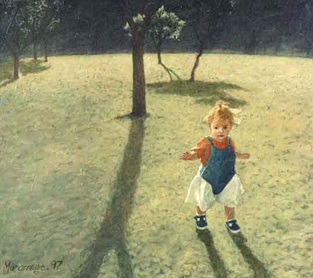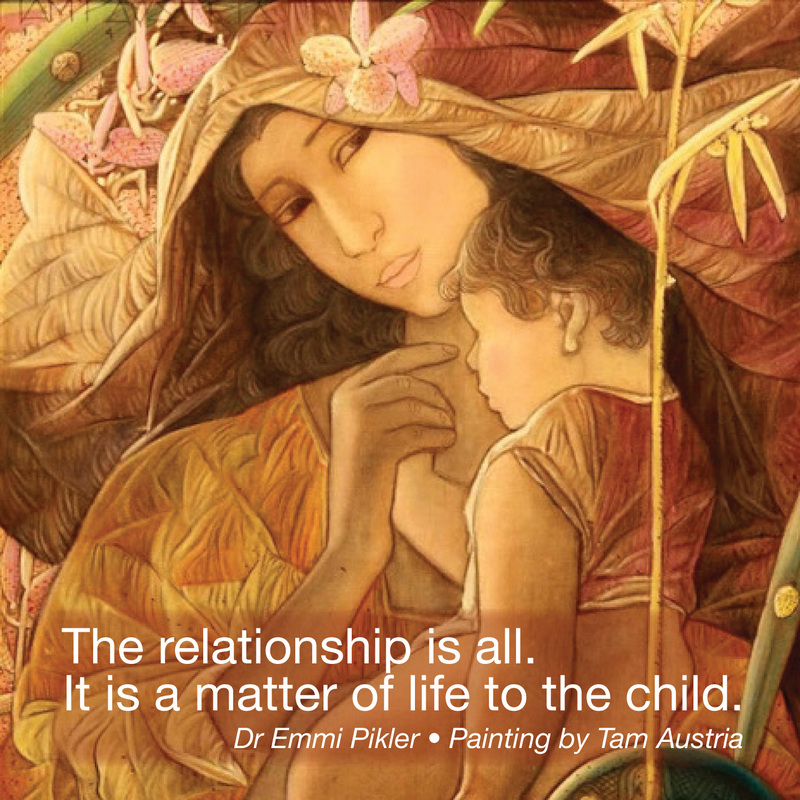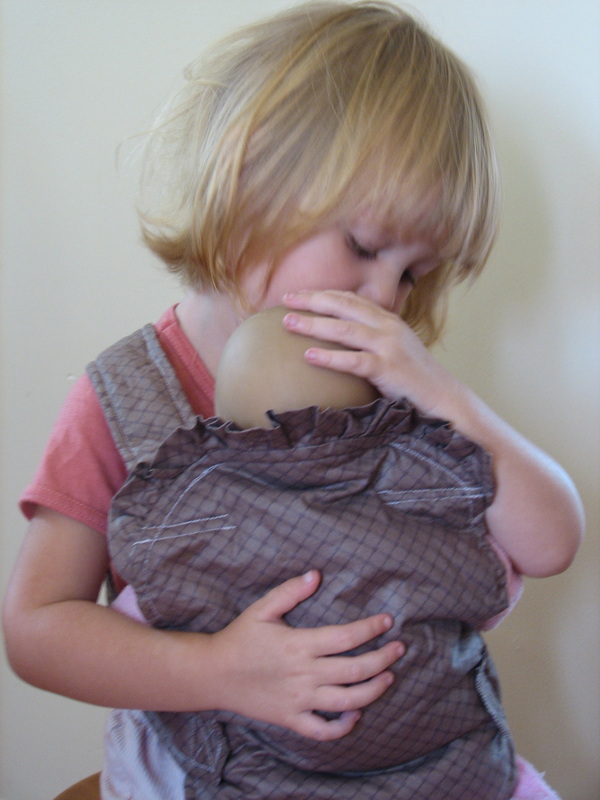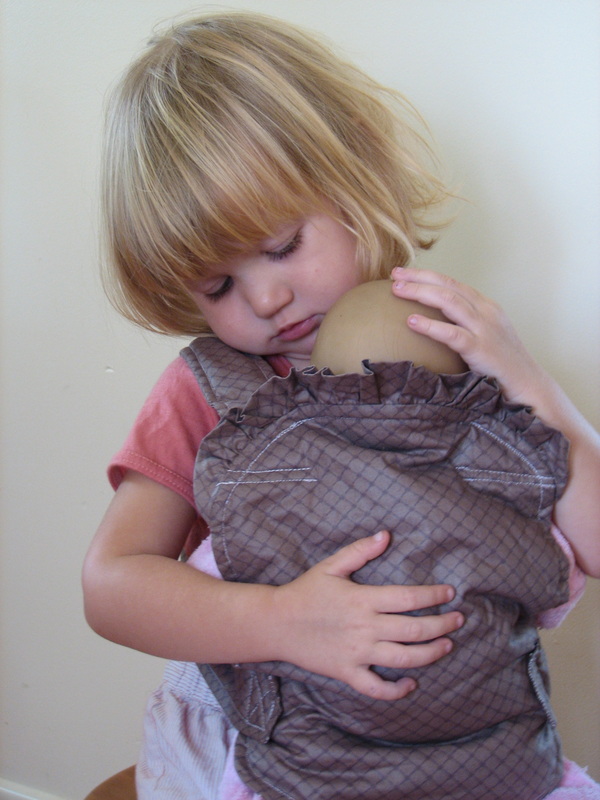|
Human Beings - Human Doings In this time of high stress for parents, babies, children, and teachers it is time to reevaluate what we want for our children and for ourselves from our education system. Part of the solution will be remembering the balance between being and doing, and then working to achieve that. Education and Cultural Imperatives Education as we know it is a cultural activity, and different cultures have different takes on what works and what doesn’t. For example, the education practices of Japan and Korea could not be more different from those of Sweden and Norway if they had planned it that way. That’s because cultural activities are always ‘man-made’, and sometimes they line up with how people are designed and how they work, and often-times they don’t. What about Biological Imperatives? Training people to work in the education industry is likewise a cultural activity and is ‘man-made’. Sometimes what we are taught - and how we are taught - lines up with how we ourselves are designed and learn, and most often it doesn’t. Moreover, almost without exception, what we are taught is not in line with how children are designed nor how they learn. It not that the information about age-appropriate biologically-neurologically-compatible teaching and learning isn’t available, it is. It’s just not taught in most education pre-service training, including Early Childhood pre-service training, and the consequences for the child under three are dire. If you are set on measuring, then unseen-reality poses a bit of a problem I believe that one of the reasons for the mismatch of biological imperatives and cultural imperatives is our compulsion to measure, especially when it rubs up against our bias against the unseen, the ‘spiritual’. ‘If it can’t be seen and measured it doesn’t exist’ seems to be the underlying mantra. Tell that to someone who is contented, curious, excited, full of wonder, in love, relaxed, or confident. These are all aspects of reality, and I would argue, they are better indicators of a successful programme than anything you can measure. It is nigh impossible to measure something you cannot see like children’s happiness; it is too hard to quantify, too hard to evaluate it’s worth empirically, and this might be the genesis of murmurings from individuals in the ERO who want a more prescriptive early childhood curriculum. It would make it easier for them to measure. Being or doing? Traditionally, teachers have been trained in skills of ‘doing’ to the exclusion of skills of ‘being’, the skills of the unseen, skills of the spirit. Our pre-service training drills us in how to ‘do’ teaching, and included in the teacher’s tool kit are the ‘doings’ of teaching, extending, planning, scaffolding, questioning... We have been modelled these behaviours - these ‘human doings’ - and we have been taught them. As a result, we often end up believing that these skills are what being a teacher is all about. To add to their legitimacy, there are rules and regulations which enforce these cultural imperatives: you have to do it or you could be mentioned in your workplace report as noncompliant and/or not ‘up to scratch’. The ethic of reciprocity - How would I like it? But what if these skills and behaviours (as valuable as they can be), block the child in her learning? What if these cultural imperatives are a poor match for the biological imperatives of the child? If we were to put ourselves into the learner’s shoes and ask ourselves, “How would I like it?” we would get a better idea about what is appropriate, and when. Let me do it If you or I were learning something that was new to us, we’d want to take our time. We’d want time to ponder, to figure it out - then try it out. If it didn’t work the first time we would try again. We’d try to figure out another way and then try that out. It depends on how much stickability we had developed as learners how long you or I would keep this ‘figure-it-out-try-it-out’ pattern going, but most of us keep going until we get it. Or until we are stymied. If we achieve it, there is such a sense of joy and wellbeing. If we are stymied then - and only then - we ask for help. And we only want as much help as we ask for, we don’t want the ‘teacher’ to take over and do it for us. This pattern of discovery is the age old human pattern that is also known as learning. It’s a species thing, it’s good for all ages of homo sapiens sapiens. We are born curious, and if we get a fair go, we want to try things out and discover how they work, in real time, in real life, not in assignments.
Too often what is deemed scaffolding, open ended questioning, extending and teaching does not facilitate the independent experimentation Emmi Pikler is talking about. Too often it is adult intrusion and leads children to learn the practice of 'brain-borrowing'. Brain borrowing is when the child takes all the cues and scaffolding to achieve something they wouldn’t have achieved independently, at least not at that time in that way. For example -
“What would happen if you turned it around? Would it fit then? Keep going. That’s the way, that way looks like it could work. Try that.” From teacher to educator This is an extreme example, but my guess is that we have all done it sometime during our journey towards being an educator rather than a teacher. That journey asks us to become skilled in Human Being, so that we know when to apply the human doings, and how to apply them in ways that allow the child the satisfaction of making her own knowledge. Pennie Brownlee • October • 2013 Not everything that counts can be counted, and not everything that can be counted counts. Albert Einstein Paintings: Top left - Adriana Mufarrege. Top right - Morgan Weistling. Bottom right - Sayda Afonina
2 Comments
Be the best you can
The ‘new age’ literature, which many people scoff at, makes an important point when it says that the best gift that we can give this planet is to Be The Best We Can. The assumption in that advice is that you and I have it in us to grow, and to become more skilled as we grow. This is another way of saying that as adults, we have the capability to change the habits of our behaviour, we can change our ‘default settings’. And as we change our behaviours becoming more skilled, more heart-based and less judgmental, we become a Gift to those around us: a non-techno-gift which undergoes periodic upgrades. How cool is that! The Default Setting is downloaded effortlessly It turns out it is very cool if you happen to be a child in the company of such a ‘Gift to the Planet’. Unlike other mammals which come onto the planet with almost all of their brains hardwired, human babies come onto the planet with approximately 15% of their brain wired up and the remaining 85% to be wired up. While we have known for decades that most of that wiring-up of the brain (learning) will happen before the child’s seventh birthday, it is only with better research tools with which to study the brain that we are growing in our understanding of just ‘how’ of this wiring up happens. The infant’s brain utilises just two bands of brainwave frequency until six years old: first delta until two years of age and then both delta and theta. Delta and theta are ‘hypnogogic’ states, meaning they are pure down-load states, and they are fast. According to Dr Bruce Lipton, in his presentation “Nature, Nurture and the Power of Love”, they process information at four billion bits each second. They miss nothing. The computer is not the programmes it downloads This ‘supreme computer’ is designed to download two programmes: the programme of what humans do in this society - the culture - so that the infant will be able to survive and operate in it, and the programme of the geographical place that the stork delivers the baby to so the child can survive and operate in it - the earth environment. Think about it: if by some cosmic accident a Bedouin baby started running the programmes ‘New Zealand Culture’ and ‘The Temperate Land at Taupo’ that would be of no use whatsoever. The Bedouin baby would not survive, he or she would need to have downloaded two very different programmes to survive in the desert (the earth environment) with people who see the world differently and who speak a different language (the culture). Fortunately, human design is so foolproof that there are no cosmic accidents of this nature. All babies download everything in their presence. They miss not one bit of information while downloading, meaning they download who you are - not who you would like to think you are. They down load all of you, conscious and subconscious, all of who you are in your default settings, into their computer as their default setting it goes. It’s kind-of-like plugging your iPod into your computer and watching the transfer of files. Frightening stuff. And if that doesn’t scare you, you haven’t understood what I have said, or you are already a Saint. Bless you. Time for your individual and for a national stocktake Why is this elegant foolproof downloading system important to us in New Zealand at this time? Well, parents learn how to parent from the way they were parented, by way of the cultural downloading process described above. Children download their ‘parenting default setting’ from those caring for them, before they are six. All well and good if the files being transferred aren’t corrupted, but New Zealand is the bottom of the OECD countries for child abuse, neglect and fatalities. Obviously, some of those files being transferred at the speed of light are not good for infants. Sure, we are probably not comparing apples with apples in that it is unlikely every country’s reporting procedures are equivalent, but all is not well for children in Godzone. I had a ‘maximum wake-up call’ when I went to the Pikler Institute in Budapest in 2004. If I were to draw a continuum with one end representing The-Supreme-Respect-for-Children-Position and the opposite end representing The-Maximum-Disrespect-for-Children-Resulting-in-Death-Position, and if I asked you to place yourself on that continuum, you would probably want to place yourself down at the Supreme-Respect end. Me too. But the wake-up call for me was that I couldn’t. Even when we think we are doing the best, we are actually nearer to the middle of the continuum. Nearer the middle is the default setting for the ‘best’ position in our culture. Change is easy The good news is that default settings can be changed in your Heart-Brain Computer. Beliefs are the programmes of your heart-brain-human-computer, and while you can ‘get inside the system’ and discover the beliefs and change them - there is an easier way. You can change what you do. Here is an example: You can replace one of your corrupted files with the belief, “A baby is a free and equal human being.” Accordingly, you start changing what you do so that you behave as though the baby is a free and equal human being. The easiest way to work out how to do this is ask yourself, “As a free and equal human being, would I like it if this were done to me?” • Would I like to be picked up physically without any warning? • Would I like to be picked up from behind without knowing it was coming? • Would I like to be passed around to people I didn’t know? • Would I like to go to sleep in one place and wake up in another place not known to me? • Would I like it if people laughed at me and called me a sook when I was crying? • Would I like it if people told me to settle down when I was excited about something? • Would I like to be ignored when I was communicating with someone? • Would I like to be exiled (up the other end of the house or being put into time out) when I was in emotional turmoil? • Would I like it if someone made me say I was sorry when I was not sorry? • Would I like it if they made me kiss the person I wasn’t sorry with? • Would I like to be put into a restraining device that I couldn’t get out of when I wanted to? • Would I like to be stuck in a position so that I couldn’t move - like being ‘plonked’ to sit? • Would I like it if I were hungry and I wasn’t allowed to eat? • Would I like it if I weren’t hungry and I had to eat? • Would I like to be made to eat everything on my plate? • Would I like it if someone wouldn’t let me go to bed when I wanted to? • Would I like it if someone made me go to bed when I didn’t want to? • Would I like to be tied into bed so that I could not move? • Would I like to be talked about, in front of me, as if I didn’t exist? • Would I like to be told what to do? • Would I like to be told to do it NOW? ... The list is endless, and a free and equal human being in a healthy relationship will not answer yes to any of the above questions. Not one. Knowing this requires us to change what we do. Relationship is what every baby is designed to download “But what if the baby doesn’t know what’s good for it,” you ask? Spot the error in that sentence. Go on, go back and read that sentence again. A baby is not an ‘it’. ‘It’ is the pronoun used for things and it tells us a lot about our cultural default setting that we can refer to a baby as ‘it’ without cringing. Back to the question: if you have asked that question, it means that your place on the continuum is being made conscious to you, your resistance to treating babies as free and equal human beings lets you know where your default setting is set. Great. That means it is now up in your consciousness, “Up and on it’s way out,” as my friend Kimberley would say. And this has been the journey for me since my visits to Budapest in 2004 and 2006. The way they do things at the Emmi Pikler Institute brought up into my consciousness my default settings - many of which were disrespectful. I am a product of my culture and I was ignorant of own lack of respect, particularly for infants. Dr Pikler dismissed the first complement of nurses employed for her nursery-home because they too were ignorant. They were medically trained, and their ‘culture’ was around germs and hospital corners, not about the critical factor in growing healthy human beings, the sanctity of the relationship. To replace the trained nurses, Dr Pikler chose untrained women who liked children, and began her own specially tailored training with this axiom: “I have no doubt that you love and care for the babies. I will show you how.” It’s as if she knew that the act of doing things differently bypasses any of the ‘corrupted cultural files’ about children. Doing things differently is ‘Respect In Action’. In turn, respect in action is what the child downloads as their default setting for care, relationship, partnership and the respectful, safe use of power. Partnership equals cooperation In any partnership neither partner is expected to be a mind reader, so instead, humans ‘ask’ for their needs to be met. Babies do not use words to ask, but they do know how to ask, it is coded into them genetically. Babies give us cues so we can partner them and meet their needs. Australian Priscilla Dunstan has shown us how to ‘read’ some of the universal baby clues so we can get off to a flying-partnership-start. Babies give us cues when they need our input, but in a child-unfriendly culture like ours, we don’t interpret the cues as requests to get legitimate needs met, we interpret them as demands. A child friendly culture wouldn’t talk about ‘demand feeding’ because it isn’t ‘demand’ feeding. It is a respectful request from the baby, who will have to ‘speak louder’ if we are deaf to her requests. What else can she do? It’s how you make me feel that will install my default setting Here are a few simple things we can do, things that feel respectful. Although each of these suggestions refers to the infant, each suggestion works for every age: for toddlers, middle childhood, teens, partners, parents, colleagues, people with very special needs, and even for elders who have started checking out of this plane. Tell your infant everything you are going to do - before you do it. That way there are no surprises. That way they know what is coming, and when they can anticipate what’s coming they can participate in the partnership with you. Ask your baby for their cooperation “I want to put this sleeve on. Will you give me your hand?” and very lightly tap your baby’s hand with your finger so that she has another clue from you - and then wait while she processes your request. “I am going to take your hand and pop it in this sleeve” - and wait before you do it. It won’t be too many weeks before the baby puts her hand into yours. When we are requested to help with the dishes (for example), none of us leaps up immediately, clicks our heels and picks up the teatowel. We are more likely to say something like, “Sure, I’ll just finish this email then I’ll be there.” Why do we expect more of infants and toddlers? Could it be that the belief in our cultural default setting is that infants and toddlers are not quite human? Acknowledge your infant’s unfolding will and autonomy Offering your child a choice acknowledges her as a free and equal human being who is learning to choose on her way to full autonomy and self discipline: “Would you like to have the red T shirt or the striped one?” “Would you like to climb into the chair by yourself or would you like me to lift you?” “You look like you have finished your food. Are you finished? Fine, I will take the plate.” “I would like to blow your nose for you. Let me know when you are ready.” The Gesture There is a gesture of invitation, which works at the physiological level. You turn you hands palm upward It alters the body’s electromagnetic frequency and every child can read the message transmitted in that frequency: it asks the invited would they like to partner you. If this sounds too good to be true, it is better than that. When you make this gesture to an infant or toddler from your place of invitation you will be amazed at the response. What has become obvious for me is that infants are wired for an equal partnership, and the first stage that they can manage in the partnership dance is responding to the invitation. It is the invitation which sets the two-way nature of the partnership, the two way interaction of two equal wills lays the foundation on which to build all future relationships. All of them. I have come to believe that one of the reasons our culture thinks so poorly about infants’ capabilities is that we don’t invite them to be partners, so they have no way they can prove to us how capable they are. Instead, we treat them as helpless, and so they download helplessness by default. Learned helplessness becomes their default setting. It cannot be otherwise. If you are reading this it is more than likely you are one of the growing number of grown-ups who is part of the evolution of consciousness around babies and children. Every one of your respectful interactions changes things for our children for the better. Pennie Brownlee After a gestation period that makes the elephant's 22 month gestation look like a nano-second, I have managed to birth a website. I've been thinking about gestation periods for a good while now - both the 40 week gestation period for the human baby (which I poetically refer to as 'getting cooked on the inside'), and the year long gestation period after the birth, or 'getting cooked on the outside". Ashley Montague labelled this period 'exterogestation'.
We make a grave mistake if we think babies are fully up and running when they are born. They are born at 40 weeks, not because they are 'fully cooked' but because at 40 weeks (give or take) they can survive outside the womb without medical assistance. As Donald Winnicott said, "There is no such thing as a baby. There is a baby and someone." There are no prizes for guessing who that someone is, but there are situations beyond our control when the mother is not there for the baby, and then it is 'another someone' who steps up as 'the trainer wheels of relationship' for the baby. The baby's little systems are not grown to the point where she can self-regulate them, so nature has designed her to be supported by the 'trainer wheels of nurture' until she can balance all of her own systems. The Brainwave Trust tells us that will take three years, that is two more years on top of the crucial year of exterogestation. What does that mean for the baby, the mother and for society. Well, it 's not a popular thing to say out loud, but actually, the baby needs the mother - and the mother needs support. When our society can support the mother (and the father) to 'be the trainer wheels of nurture' for the baby everyone wins. New Zealand is not Sweden and we do not support parents to bring up our citizens in their vulnerable years, although the state is prepared to pay to have other people look after them. The statistics for infants going into care when they are still in their exterogestation period in this country are alarming. More alarming when you realise these babies are going to people whose preservice training may have had a paper on the special needs of infants and toddlers, but many training providers qualify teachers without any training for our babies and toddlers, and the evidence is everywhere:
How can we support the mother, the family and the baby so that the baby is not the casualty of a political-economic expedient? That's a question suitable for gestation, and it is going to take all of us to birth a decent answer around that one! Let's hope and pray that the answer is not a long time coming. Reading: "Raising Babies: Should Under Threes Go to Nursery?" Steve Biddulph "Why Love Matters: How Affection Shapes a Baby's Brain" Sue Gerhardt |
Author
Still a believer in the printed word - does that make me a fossil? Archives
April 2020
Categories
All
|










 RSS Feed
RSS Feed
